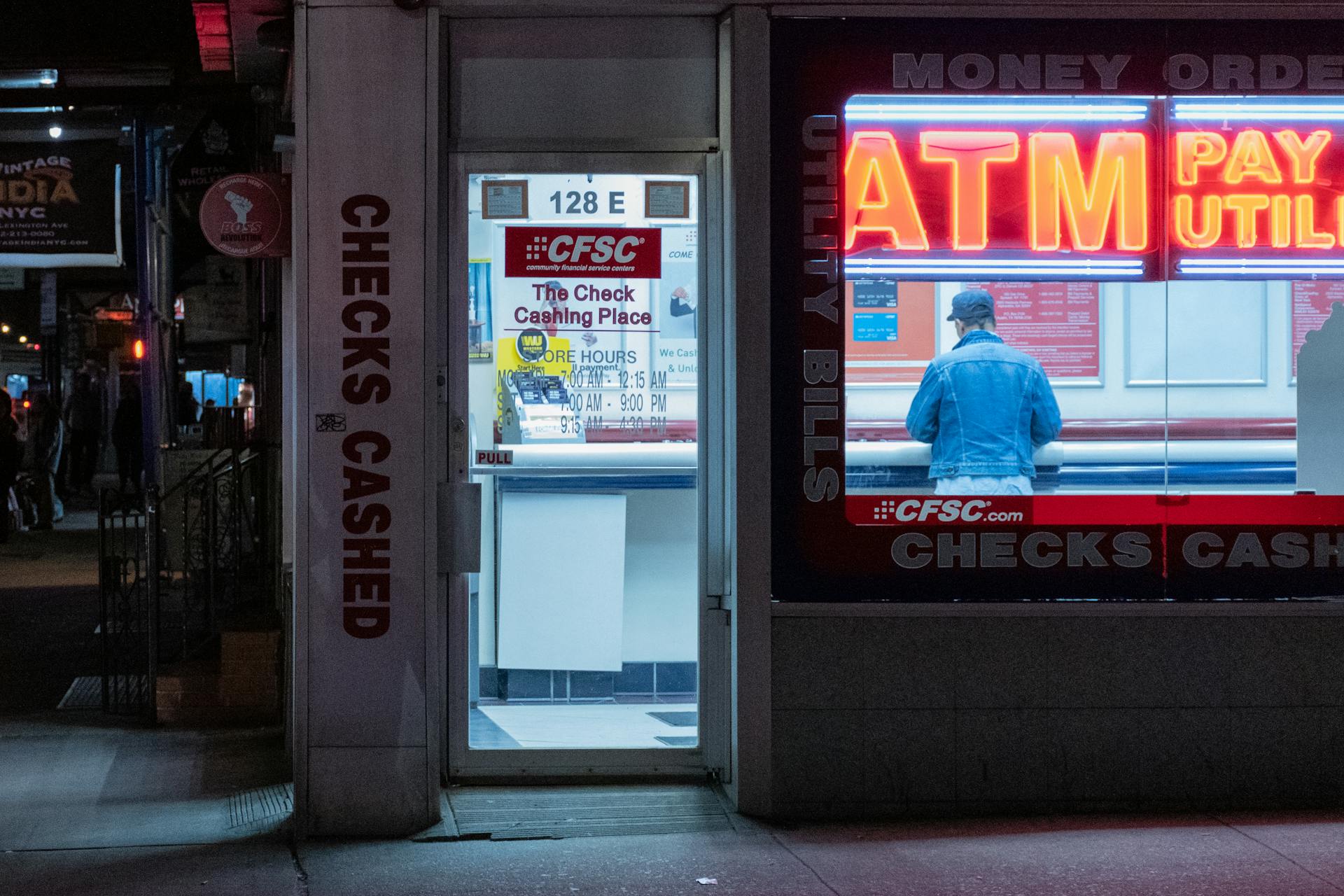
If you're a business owner considering a merchant cash advance, you're not alone. Many entrepreneurs turn to these advances as a way to access capital quickly, but they can come with high fees and strict repayment terms.
Some business owners are exploring alternative options, such as invoice financing, which allows them to sell outstanding invoices to a third party at a discount.
Invoice financing can be a more flexible option than a merchant cash advance, with repayment terms that are often tied to the customer's payment schedule.
Many businesses are also turning to traditional bank loans, which can offer lower interest rates and more favorable repayment terms than a merchant cash advance.
Worth a look: Merchant Account Fee
What is a Merchant Cash Advance?
A merchant cash advance is a financing option that provides small businesses with a lump sum of money to cover unexpected expenses or cash flow gaps. This infusion of cash can be a lifesaver for businesses that need to fix unexpected issues, like water damage in a coffee shop.
The merchant cash advance works by forwarding payment to your business against future credit or debit card sales. This means that the lender is essentially buying your future sales transactions.
Here's how it typically works:
- Your business receives the cash and agrees to the amount you need.
- The financing company charges fees, usually in the form of a factor rate that gets multiplied by the entire loan amount.
- Your business repays based on future sales, often daily or weekly, until the borrowed amount plus the factor rate and any other fees are paid off.
For example, a $100,000 advance with a factor rate of 1.4 would cost a total of $140,000. This means that your business would repay $140,000 over time, rather than paying interest on a traditional loan.
Repayment and Fees
Merchant cash advances come with two options for repayment terms: a percentage of your credit card sales or a fixed payment. Most MCAs keep repayment periods short, typically 18 months or less.
You'll want to calculate each repayment based on a percentage of your sales. For example, if you have weekly sales of $50,000 and a 20% holdback, your repayment would be $10,000.
The length of repayment will depend on your sales and the holdback percentage. In the example above, it would take 14 weeks to repay $140,000 with a $10,000 weekly repayment.
Merchant cash advance loans subtract fees upfront, so if the MCA charges $1,000 in fees for a $5,000 advance, your business will receive $4,000 in funding.
Typical financing fees for MCAs include factor rates, origination fees, underwriting or funding fees, and administrative fees. These fees can add up quickly, so it's essential to understand what you're paying.
Factor rates can range from 1.1 to 1.5, multiplying that rate by the amount you're borrowing. For example, a $100,000 cash advance with a factor rate of 1.4 would result in an annual interest rate of 34 percent.
Fixed withdrawals from your business bank account can be a convenient option, but you don't have the flexibility to extend the repayment term if revenue slows down. The fixed amount is calculated from your estimated monthly sales.
The overall cost of your MCA will depend on various factors, including the company you get your MCA from, the terms you agree to, and your state. Highly qualified businesses will generally get more favorable terms.
Here's a breakdown of the typical fees associated with MCAs:
The estimated APR is another crucial factor to consider when selecting an MCA. You'll want to understand the estimated APR and whether collateral or a personal guarantee is required.
It's also essential to consider the requirements for your business and how quickly you can be funded. The repayment and remedy terms should be clearly outlined in the agreement, including whether the payment amounts are based on good faith estimates of your income.
Pros and Cons
A merchant cash advance can be a good option for businesses in need of fast funding. Approval rates can be as high as 90 percent, making it an accessible type of business financing for bad credit borrowers.
You can get funded within 24 to 48 hours, which is much faster than traditional loans. Most merchant cash advances are offered through online lenders, which often have a streamlined online application process.
One of the biggest benefits of an MCA is the flexibility it offers in terms of payment options. However, this can also be a drawback, as daily or weekly repayments can be aggressive and may not be suitable for all businesses.
Here are some key pros and cons to consider:
- Approval rates: up to 90%
- Funding time: 24 to 48 hours
- Payment options: daily or weekly repayments
- Factor rate fees: 50-100% or higher
- Repayment schedule: until the advance is fully repaid
Keep in mind that merchant cash advances don't report payments to credit bureaus, so they won't help improve your credit score.
Discover more: Cash Advance Apps No Credit Check No Direct Deposit
Pros
Approval rates for merchant cash advances can be as high as 90 percent, making them an accessible type of business financing for bad credit borrowers.

Fast funding is another benefit, with most MCAs offered through online lenders that fund within 24 to 48 hours. You may be able to apply through a streamlined online application.
No collateral is needed for an MCA, as the financing company uses future revenue to guarantee repayment.
You don't need to have collateral to back up the loan, giving you more flexibility in your business.
A lender will pull your credit score, but MCAs tend to be more forgiving for businesses with mediocre or bad credit.
Merchant cash advances offer flexible payment options, allowing you to adjust the daily holdback of your transactions if you're going through a slow sales period.
Here are some key benefits of a merchant cash advance:
- Approval rates as high as 90 percent
- Fast funding within 24 to 48 hours
- No collateral needed
- Flexible payment options
Cons
A merchant cash advance (MCA) might seem like a quick fix for your business needs, but it's essential to consider the downsides. Here are some key cons to keep in mind:
MCAs often come with an aggressive repayment schedule, requiring daily or weekly payments until the advance is fully repaid.

The factor rate fees on an MCA can be steep, translating into interest rates of 50 percent to 100 percent or higher, which is more than conventional loans.
You won't be building credit with an MCA, as these don't report your payments to the credit bureaus, so you won't see any credit improvement.
MCAs aren't subject to loan usury laws, which means they can charge higher rates than traditional loans.
Here are some key cons to consider:
Alternatives to Merchant Cash Advances
If you're considering a merchant cash advance, it's worth exploring alternative options. Most banks offer conventional small business loans with favorable terms, but longer turnaround times.
You can also consider small business credit cards that offer rewards and incentives for new customers. These can be a great option for day-to-day purchases.
Other alternatives include installment loans, which can provide a more structured repayment plan. The Small Business Administration (SBA) loans and SBA Economic Injury Disaster Loan (EIDL) program loans can also be viable options, especially for businesses in need of emergency funding.
Expand your knowledge: Tax Refund Cash Advance Emergency Loans 2024
Alternatives to Consider
If your business doesn't qualify for a merchant cash advance, there are still plenty of options available to you. Most banks offer more conventional small business loans with favorable terms, but longer turnaround times.
One alternative is a business line of credit, which can be easier to qualify for than a traditional loan. Online lenders keep eligibility requirements loose, requiring a 600 minimum credit score and as little as six months in business.
Business credit cards are another option if your business doesn't need much funding or doesn't qualify for business loans. The card sets a credit limit, such as $50,000, and typically offers 1 percent to 5 percent rewards for purchases.
If you don't have good credit, you can look into credit-building business credit cards, such as the Spark 1% Classic, which doesn't charge an annual fee and offers 1 percent cash back on all purchases.
For businesses that are deemed "high risk" and are usually shut out from a normal merchant cash advance, a high-risk merchant account can be a viable option. These services fill an important need and can provide an alternative source of funding.
A fresh viewpoint: Risk Appetite News
Invoice Financing
Invoice financing is a viable alternative to merchant cash advances, using outstanding invoices to provide a cash advance. You can receive a percentage of the total invoice amount from a factoring company.
The factoring company collects payment from your clients, takes out fees, and pays your business the remainder. This arrangement can be a good option if you have a steady stream of clients with outstanding invoices.
You're responsible for collecting the payments instead of the financing company, which can be a challenge if your clients are slow to pay.
Lendio
Lendio is a great option to consider when looking for alternative funding options. You can borrow between $500 and $5 million through Lendio.
Lendio's APR range starts as low as 3%, which is a relatively competitive rate.
To be eligible for a loan through Lendio, you'll need a minimum credit score of 560. You'll also need to have been in business for at least six months and have a minimum annual revenue of $50,000.
The application process through Lendio is quick and easy, taking just 15 minutes to complete. Once you've reviewed your offers and been approved by your lender, you can receive your funds in as little as 24 hours.
Who's Best For?
If you're a small business owner struggling to get ahead, an MCA might be a good option for you. A merchant cash advance can provide the extra funds you need to become more competitive and functional.
However, it's not the best choice for every small business. If you're looking for help after a major disaster that shut down your operations, you're better off exploring traditional bank loans or grants.
Small businesses that can't secure bank loans may find an MCA to be a viable alternative.
Discover more: Self Employed Payday Loan
Regulatory and Legal Aspects
The merchant cash advance industry is facing increased scrutiny from regulatory bodies, including the FTC. The FTC has taken enforcement actions against companies that misrepresent the terms of their financial products, including the amounts funded to debtors and the requirement of collateral and personal guarantees.
The FTC has also highlighted the importance of not making false or unlawful threats when collecting debt. MCA companies must be aware of their historical tactics of over-collecting and making threats of arrest, violence, and harassment.
New disclosure requirements have been implemented in Connecticut, preventing merchant cash advance contracts from waiving the right to notice and a hearing before entry of a prejudgment remedy. This change may impact the way MCA companies operate in the state.
In some cases, merchant cash advances may be considered usurious loans, which are unenforceable under Connecticut law. If a funder attempts to collect on such a loan, the seller may be entitled to triple damages and attorneys' fees.
The Consumer Financial Protection Bureau (CFPB) may soon have regulatory authority over the MCA industry, extending protections to small business borrowers similar to those available to consumer borrowers.
Are Legal?
Merchant cash advances are indeed legal, and they're considered purchases of your future sales. This means you're buying a service that advances you money in exchange for a percentage of your future sales.
In the US, merchant cash advances are regulated by state laws, but they're not considered loans in the classical sense. This is why they're often used by businesses that don't qualify for traditional loans.
Merchant cash advances are often used by small businesses that need quick access to cash, and they can be a good option for businesses with bad credit. However, it's essential to understand the terms and conditions before signing up.
Here are some key points to consider:
- Merchant cash advances are considered purchases of future sales.
- They're regulated by state laws in the US.
- They're often used by small businesses with bad credit.
- They can provide quick access to cash.
New Disclosure Requirements
Public Act 23-201 was passed by the General Assembly, implementing new financing disclosure requirements for merchant cash advance contracts.
These requirements prevent certain contracts from waiving the right to notice and a hearing before entry of a prejudgment remedy, starting from July 1, 2024.
The new statute aims to protect merchants from predatory practices by funders who might take advantage of unsophisticated businesses.
Merchant cash advance contracts can be complex, making it easier for opportunistic funders to engage in unlawful practices.
The new disclosure requirements are a step towards regulating the merchant cash advance industry and preventing usurious loans that are unenforceable under Connecticut law.
If a merchant cash advance is found to be a disguised loan, it may create a cause of action for the seller to seek damages from the funder under federal law.
Usurious Loans
Merchant cash advances can be a complex and potentially usurious form of financing. Some loans characterized as merchant cash advances may be deemed usurious, which means they can be subject to strict regulations and even triple damages and attorneys' fees.
In Connecticut, for example, state law prohibits actions on usurious loans, and the lender may be liable to the borrower for triple damages and attorneys' fees. This is because the law views merchant cash advances as potentially disguised usurious loans.
Courts in Connecticut and New York have held that merchant cash advances may indeed be usurious, and the Second Circuit has agreed that such loans may give rise to liability under federal law. This means that borrowers may be entitled to treble damages and attorneys' fees, separate from any state usury laws.
The federal cause of action may entitle a claimant to treble damages and attorneys' fees, making it essential for lenders to ensure they are complying with all applicable laws and regulations.
Hardship Relief
Hardship Relief is a viable option for those struggling to make merchant cash advance payments. It's a good idea to call your MCA Company and explain your situation.
Requesting hardship relief can lead to a modification of your payment structure or a forbearance period with temporarily suspended payments. Many MCA lenders are willing to work with you due to the current economic climate.
Some MCA lenders may be more willing to offer relief due to their own financial struggles, such as the cash crunch caused by the Covid 19 pandemic.
Expand your knowledge: Apple Payments News
Regulatory Actions and Oversight
Regulatory actions are taking place to oversee the merchant cash advance industry. The Consumer Financial Protection Bureau (CFPB) may soon have the authority to regulate small business financing, similar to its current role in consumer financial services.
U.S. Representative Nydia M. Velázquez introduced a bill, the Small Business Lending Disclosure and Broker Regulation Act, which would grant the CFPB this authority. This bill aims to protect small business borrowers from predatory lending practices.
For more insights, see: Ally Financial News
Regulators have begun to scrutinize merchant cash advance companies, and some have been raided by the FBI. For example, Par Funding, a merchant cash advance lender, was raided by the FBI and sued by the Securities and Exchange Commission (SEC) for allegedly raising $600 million from investors through unregistered securities.
The FTC and New York Attorney General have also taken action against two merchant cash advance companies, RCG Advances and Ram Capital Funding. These lawsuits highlight concerns about the industry's marketing practices, loan offerings, and aggressive collection practices.
Additional reading: Wedbush Securities News
Companies Under FTC and SEC Scrutiny
Par Funding, a merchant cash advance lender, was raided by the FBI on July 28, 2020, and its corporate headquarters were seized.
The SEC sued Par Funding, alleging that they raised approximately $600 million from investors through unregistered securities and loaned/advanced to small businesses at extremely high repayment rates.
Joseph W. LaForte, the de facto CEO of Par Funding, was arrested on August 7th, 2020, on a weapons charge in Pennsylvania.
The SEC alleges that Par Funding's default rate exceeded 50% and that the company filed over 2,500 lawsuits against merchant debtors in New York and Pennsylvania since 2013.
Yellowstone Capital, a leading merchant cash advance lender, was accused by the FTC of using deceptive practices to bait small business borrowers and withdrawing money from their accounts without their consent.
The FTC complaint alleges that Yellowstone Capital withdrew hundreds or thousands of dollars from small businesses' accounts after the customers had repaid the entire amounts owed in their contracts.
RCG Advances and Ram Capital Funding, two merchant cash advance companies, were targeted by the FTC and the New York Attorney General for their marketing practices, offering of financial products, and aggressive collection practices.
The New York Attorney General asserts that defendants disguised each loan as a "Purchase and Sale of Future Receivables", but in reality, the transactions were loans.
Creditor & Vendor Communication
Good communication with creditors and vendors is crucial when facing financial difficulties. Most lenders don't want to litigate if they can avoid it, as it can cost them thousands of dollars in legal fees.
Notifying your creditors about your situation is a good business practice. It may make more sense to the lender to accept reduced payments rather than incurring legal fees to sue.
If you're having trouble making payments, it's essential to reach out to your lender to discuss your options. The Merchant Cash Advance attorneys at the Business Debt Law Group can help you navigate this process.
Lenders may be more willing to work with you if you're proactive in communicating your financial difficulties. Unlike debt settlement companies, the Business Debt Law Group is a law firm that can defend Merchant Cash Advance lawsuits.
On a similar theme: Santander Group News
Frequently Asked Questions
What is the outlook for the merchant cash advance industry?
The merchant cash advance industry is expected to grow significantly, with a projected increase from $17.22 billion in 2023 to $24.14 billion by 2028, driven by e-commerce expansion and fintech advancements. This growth is expected to occur at a steady 7% compound annual rate.
Can MCA freeze your bank account?
Yes, a judgment from a Merchant Cash Advance (MCA) provider can lead to a bank account freeze, among other serious consequences. This is a potential risk if you default on an MCA loan.
Sources
- https://www.bankrate.com/loans/small-business/what-is-a-merchant-cash-advance/
- https://www.forbes.com/advisor/business-loans/merchant-cash-advance/
- https://www.cbia.com/news/issues-policies/merchant-cash-advance-litigation-ct/
- https://businessdebtlawgroup.com/state-of-merchant-cash-advance-during-coronavirus-pandemic/
- https://debanked.com/2023/02/the-merchant-cash-advance-journey-from-broker-to-funder/
Featured Images: pexels.com


